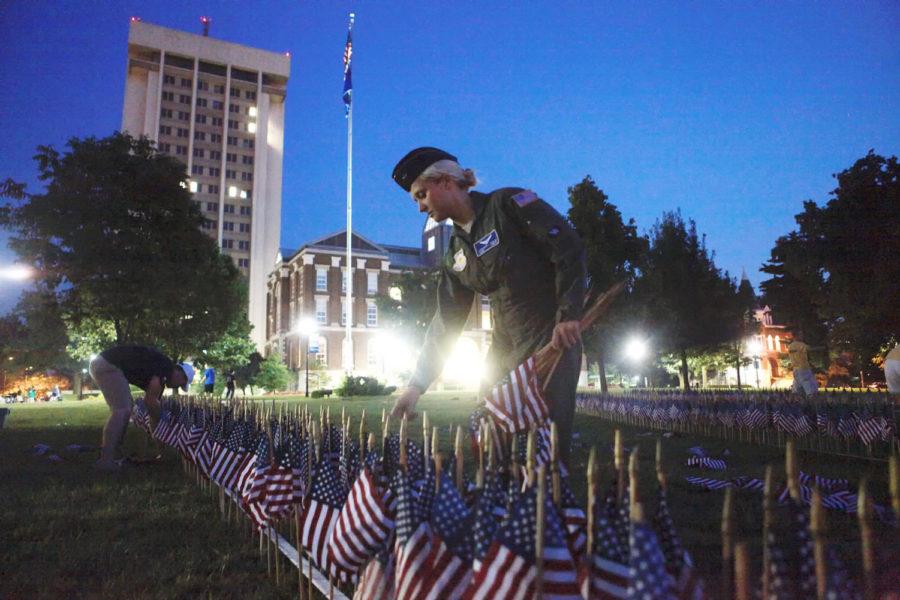After sixteen years, effects of 9/11 still present
Stephanie Imeson arranges flags for the 9/11 memorial in front of the main building in Lexington, Kentucky on Tuesday, Sept. 10, 2013. Photo by Emily Wuetcher | Staff
September 11, 2017
This year, America recognizes the 16th anniversary of 9/11. UK’s new 2017 freshmen were only toddlers when this terrorist attack occurred, but the tragedy continues to impact lives today.
The terrorist attack that occurred on September 11, 2001, seriously hurt the American economy. “Damaged economy” has become a common, yet ignored, term. People forget that it affects individuals, not just the collective group.
The damage to individuals is very real, according to Associate Professor of Political Science Stephen Voss.
“The damage to the economy hurt the students graduating in those post 9/11 years,” Voss said. “They could not get jobs upon graduating. Those delays are something that followed them throughout their careers.”
9/11 changed politics as well. Immediately after the attacks, Voss said, students were much more conservative than they are now. In the years that followed, however, students leaned increasingly toward the liberal political views.
“Students became much more politically aware,” Voss said.
Views of immigration also changed with 9/11.
“Immigration became such a sensitive subject,” Voss said. “Republicans became much more hostile of it, and Democrats became much more supportive.”
This problem has not vanished in the past 16 years.
“We are still operating in the shadow of 9/11 when we debate immigration,” Voss said. “It became a question of national security.”
The United States’ relationship with other nations was greatly affected by the terrorist attack as well.
“Immediately after 9/11, the United States enjoyed widespread sympathy and support, but once foreign policy shifted toward pursuing a War on Terror, the United States found itself growing increasingly isolated across the globe,” Voss said.
He said public opinion turned against the U.S. in many countries, even those that initially supported U.S. efforts.
“The hostility receded a bit with the election of President Obama, but not permanently,” Voss said. “By 2015, the public in allied countries such as Canada, Germany and the United Kingdom still expressed less favorability toward the United States than they had in 2002.”
On a positive note, Voss said he feels that the national unity immediately after 9/11 is a memory Americans can look back on and learn from. Even though the patriotism our nation experienced as a result of 9/11 faded, it remains a powerful memory.
“People can remember when our divisions didn’t matter,” Voss said. “People came together, rallied around the flag and showed spirit that we rarely see.”






























































































































































